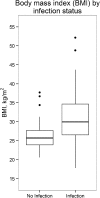Glycemic Status and Infection Risk in Nondiabetic Autologous Hematopoietic Cell Transplantation Recipients
- PMID: 26792914
- PMCID: PMC5942491
- DOI: 10.1177/1099800415619227
Glycemic Status and Infection Risk in Nondiabetic Autologous Hematopoietic Cell Transplantation Recipients
Abstract
Background: Patients undergoing hematopoietic cell transplantation (HCT) for hematological malignancies experience a number of challenges during treatment. There is growing evidence that malglycemia (hyperglycemia, hypoglycemia, and/or increased glycemic variability) contributes to HCT-related complications, even in patients without preexisting diabetes. The purpose of this pilot study was to investigate factors influencing glycemic status and associated infection occurrences in nondiabetic autologous HCT recipients.
Methods: Oncology patients without preexisting diabetes treated with autologous HCT at a National Cancer Institute-designated cancer center were followed from admission through discharge or 28 days post-HCT. Patients had morning fasting laboratory tests. Descriptive statistics and Cox proportional hazards models were used to examine associations between BG levels and risk for infection while adjusting for baseline covariates including age, body mass index (BMI), cumulative glucocorticoid dose, and diagnosis.
Results: The sample included 28 female and 25 male predominately non-Hispanic White patients (mean age 55.7 years, SD = 11.32). Blood glucose (BG) range was 35-325 mg/dl. Twenty-three patients incurred at least one infection. BMI ≥ 25 kg/m(2) was associated with high BG and infections. In the multivariate Cox model, an increase of 1 interquartile range in BG 2 days before infection was associated with a moderately increased risk of infection (hazard ratio = 1.44, p = .008).
Conclusions: Understanding the contributors to and consequences of malglycemic events can lead to better protocols for identifying patients at greater risk for infection. Further investigation is warranted for interventions to mitigate BG events for improved outcomes.
Keywords: autologous hematopoietic cell transplantation; glycemic status; infections.
© The Author(s) 2016.
Conflict of interest statement
Figures


Similar articles
-
Trajectories of Fasting Blood Glucose in Autologous Hematopoietic Cell Transplantation.Cancer Nurs. 2019 Jul/Aug;42(4):307-313. doi: 10.1097/NCC.0000000000000627. Cancer Nurs. 2019. PMID: 30024438 Free PMC article.
-
The impact of hyperglycemia on hematopoietic cell transplantation outcomes: an integrative review.Oncol Nurs Forum. 2014 Sep;41(5):E302-12. doi: 10.1188/14.ONF.E302-E312. Oncol Nurs Forum. 2014. PMID: 25158667 Review.
-
The contribution of malglycemia to mortality among allogeneic hematopoietic cell transplant recipients.Biol Blood Marrow Transplant. 2009 Mar;15(3):344-51. doi: 10.1016/j.bbmt.2008.12.488. Biol Blood Marrow Transplant. 2009. PMID: 19203725 Free PMC article.
-
Glycemic control among older adult hematopoietic cell transplant recipients.J Gerontol Nurs. 2010 Feb;36(2):40-50. doi: 10.3928/00989134-20091207-99. Epub 2010 Feb 5. J Gerontol Nurs. 2010. PMID: 20047243
-
Alloreactivity as therapeutic principle in the treatment of hematologic malignancies. Studies of clinical and immunologic aspects of allogeneic hematopoietic cell transplantation with nonmyeloablative conditioning.Dan Med Bull. 2007 May;54(2):112-39. Dan Med Bull. 2007. PMID: 17521527 Review.
Cited by
-
Hyperglycemia, symptoms, and symptom clusters in colorectal cancer survivors with type 2 diabetes.Support Care Cancer. 2022 Dec;30(12):10149-10157. doi: 10.1007/s00520-022-07442-3. Epub 2022 Nov 14. Support Care Cancer. 2022. PMID: 36376764
-
Measurement of Hyperglycemia and Impact on Health Outcomes in People With Cancer: Challenges and Opportunities.Oncol Nurs Forum. 2017 Jul 1;44(4):E141-E151. doi: 10.1188/17.ONF.E141-E151. Oncol Nurs Forum. 2017. PMID: 28632250 Free PMC article. Review.
-
Impact of diabetes (type 2) and glycemic control on health-related outcomes of patients receiving chemotherapy for non-metastatic breast cancer: a retrospective analysis.Support Care Cancer. 2023 Jan 13;31(2):114. doi: 10.1007/s00520-022-07563-9. Support Care Cancer. 2023. PMID: 36637522
-
Higher In vitro Proliferation Rate of Rhizopus oryzae in Blood of Diabetic Individuals in Chronic Glycaemic Control Compared with Non-diabetic Individuals.Mycopathologia. 2017 Dec;182(11-12):1005-1014. doi: 10.1007/s11046-017-0174-0. Epub 2017 Jul 6. Mycopathologia. 2017. PMID: 28685375 Free PMC article.
-
Trajectories of Fasting Blood Glucose in Autologous Hematopoietic Cell Transplantation.Cancer Nurs. 2019 Jul/Aug;42(4):307-313. doi: 10.1097/NCC.0000000000000627. Cancer Nurs. 2019. PMID: 30024438 Free PMC article.
References
-
- Aisenberg G., Rolston K. V., Safdar A. (2004). Bacteremia caused by Achromobacter and Alcaligenes species in 46 patients with cancer (1989-2003). Cancer, 101, 2134–2140. - PubMed
-
- Barone B. B., Yeh H. C., Snyder C. F., Peairs K. S., Stein K. B., Derr R. L.…Brancati F. L. (2008). Long-term all-cause mortality in cancer patients with preexisting diabetes mellitus: A systematic review and meta-analysis. Journal of the American Medical Association, 300, 2754–2764. doi:10.1001/jama.2008.824 - PMC - PubMed
-
- Butler S. O., Btaiche I. F., Alaniz C. (2005). Relationship between hyperglycemia and infection in critically ill patients. Pharmacotherapy, 25, 963–976. - PubMed
-
- Campisi J., d’Adda di Fagagna F. (2007). Cellular senescence: When bad things happen to good cells. Nature Reviews. Molecular Cell Biology, 8, 729–740. - PubMed
Publication types
MeSH terms
Substances
Grants and funding
LinkOut - more resources
Full Text Sources
Other Literature Sources
Medical

